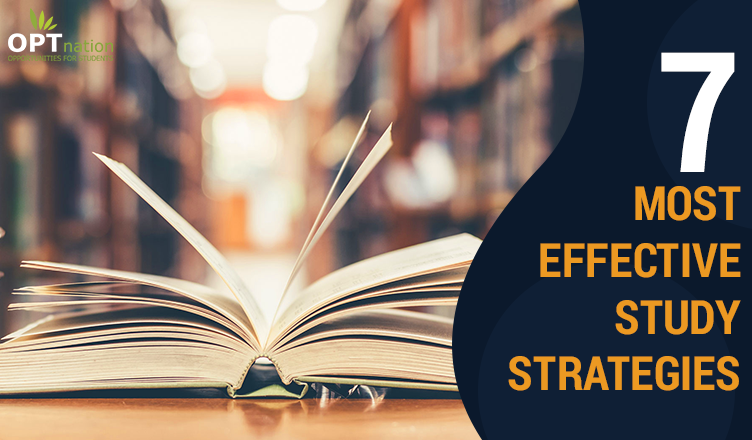Topmost Study Strategies For OPT Students Should Follow
Students spend a lot of time studying to get the grades they want. Most students know that studying is important, but many of them aren’t sure how to do it effectively.
One of the most critical factors in college study habits is knowing which techniques work and which don’t. The following study strategies can help students take steps in the right direction to become successful in academics.
1. Quiz Yourself : Study Strategies
People think they memorize better when they reread material repeatedly, but this doesn’t always work. But when you test your knowledge, it improves your retention ability, so you can recall what you’ve learned later.
Try to check what you already know about the topic so you can determine what to expect before you begin studying. If you need to work on an academic paper, you can find “do my essay for me” service for practical paper writing guidelines. Ask yourself which task is the most important at the moment and prioritize accordingly.
If you’re running out of time, don’t focus on rereading your notes or textbooks over and over. Instead, try quizzing yourself on key facts and concepts – you might remember the rest in the process.
2. Space Out Study Sessions
No matter how intense the academic load is, don’t lock yourself in your room and sit for ten hours straight trying to memorize everything.
Your brain doesn’t work well when it’s tired, so you’ll be much better off spreading out your studying over several short sessions than by trying to learn all the material at once.
Schedule a couple of hours a day to study with sufficient breaks in between to ensure that your mind is refreshed each time you start learning again.
You can also turn to a paper help online service to complete the most tedious assignments. This way, you can dedicate more time to the tasks you’re most interested in.
3. Get Adequate Sleep Hours
It can be tempting to spend all your free time cramming before a big exam. But staying up late doesn’t help you learn the material better and could even hurt your grades by decreasing the quality of your studying.
Your brain needs time to rest and recuperate after a busy day. When you ignore your need to relax, it’s harder for new information to stick in your memory, and you’ll remember less than you would if you’d gotten some sleep.
So, avoid pulling an all-nighter. It doesn’t work very well and makes you feel terrible the next day. It saps your energy and makes it harder to concentrate.
4. Connect Concepts and Ideas
When you’re trying to learn something new, it’s important that you don’t focus on memorizing individual facts; instead, try to figure out how different ideas work together so you can understand the bigger picture.
For example, when studying basic biology, don’t just try to memorize what a frog’s digestive system looks like. Instead, think about why it’s designed that way and how it benefits the frog in its natural environment.
This will help you understand things more deeply and remember them long-term.
5. Use Mnemonic Devices
A mnemonic device is a little trick to help you remember something, such as “Every Good Boy Does Fine” for the lines on the treble clef in music notation. Mnemonics are particularly helpful in learning long lists of items, such as the order of the planets in our solar system.
To use a mnemonic device, all you have to do is learn the little trick that links whatever you’re trying to memorize with something else that’s easy to remember. For example, if you want to remember the periodic table elements, you could think of each one as a product on sale in the supermarket.
ALSO READ:
OPT Jobs In USA
40+ OPT Jobs In USA To Start Your Career In 2022
6. Summarize Information
After learning the material, summarize it in your own words as soon as possible. This forces you to think about the information and process it in a way that makes it stick in your mind.
Write down what you need to remember on index cards or sticky notes and use them while you’re studying to make sure that you can still answer questions about each of the points you listed.
Besides, it’s easier to retain shorter snippets of information than long chunks. So, instead of writing down everything you need to remember, list the key points to keep in mind while studying and reviewing what you’ve learned.
7. Organize Your Notes
Disorderly and incomplete notes and outlines can lead to confusion and frustration during studying. This will inevitably result in wasted time looking for specific information in your notes when you need it most.
So, take the time to organize your notes by color-coding different topics or adding headings with descriptions of each section so that while preparing for exams, you’ll be able to find information quickly.
When studying, try to cover one topic entirely before moving on to the next; this will help you consolidate your knowledge of each section before combining everything.
The Bottom Line : Study Strategies
There’s no one-size-fits-all solution to learning. It’s a process that works differently for every person. So, the only way to figure out what works best for you is by experimenting with different strategies until you find the one that clicks.
If you want to learn something new, try following these steps of study strategies and see how much easier it will be to absorb information.
What is OPT? We often hear about international travelers mentioning studying in the USA and working with OPT. But the real answer is simple. An OPT is just a work authorization that helps in getting OPT jobs for international students.

